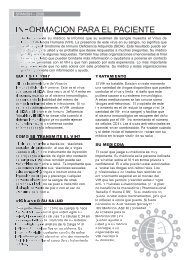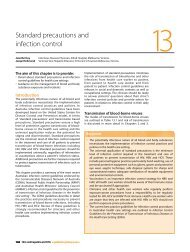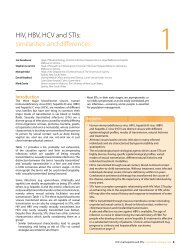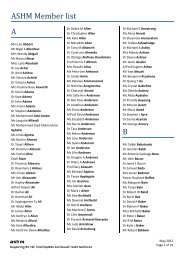B Positive – all you wanted to know about - ASHM
B Positive – all you wanted to know about - ASHM
B Positive – all you wanted to know about - ASHM
Create successful ePaper yourself
Turn your PDF publications into a flip-book with our unique Google optimized e-Paper software.
Privacy issues<br />
there are a number of broad privacy-related<br />
issues that face general practitioners and other<br />
primary health care providers. these include:<br />
� Collecting information<br />
norm<strong>all</strong>y, general practitioners should only<br />
collect health information <strong>about</strong> patients with<br />
their consent. it is usu<strong>all</strong>y reasonable <strong>to</strong> assume<br />
that consent is implied if the information is<br />
noted from details provided by the patient<br />
during a consultation, as long as it is clear that<br />
the patient understands what information is<br />
being recorded and why. it is also vital <strong>to</strong> ensure<br />
that record keeping is thorough and accurate:<br />
both <strong>to</strong> ensure the best-possible ongoing<br />
treatment of a patient and, in the worst-case<br />
scenario, <strong>to</strong> be used as defence if a case is made<br />
against a treating doc<strong>to</strong>r.<br />
� Ensuring consent is ‘informed’<br />
<strong>all</strong> medical procedures require informed<br />
consent. Given that the consequences of being<br />
tested may be substantial, it is important <strong>to</strong><br />
realise that, while running tests may be standard<br />
for the health care practitioner, receiving the<br />
results may be anything but routine for the<br />
patient. the provision of information should<br />
<strong>all</strong>ow the health care practitioner <strong>to</strong> discuss<br />
the risks and benefits <strong>to</strong> the patient in their<br />
particular situation, thereby facilitating their<br />
decision-making process.<br />
� Advising use<br />
Patients are not able <strong>to</strong> consent <strong>to</strong> the use of<br />
their information if they are unclear where<br />
the information will go and why. if possible,<br />
patients should be advised of the use of their<br />
information when it is collected, which can occur<br />
through usual communication during a regular<br />
consultation. this point also relates <strong>to</strong> instances<br />
when personal information cannot be shared<br />
or disclosed. in a recent legal case, a doc<strong>to</strong>r<br />
failed <strong>to</strong> inform two patients attending a joint<br />
consultation that the results of each person’s<br />
test could not be disclosed <strong>to</strong> the other person,<br />
and consequently failed <strong>to</strong> seek either their<br />
understanding of that situation or their consent<br />
for their test results <strong>to</strong> be shared. Please refer <strong>to</strong><br />
asHM Viral Hepatitis Models of care Models of<br />
care database for a summary of relevant case<br />
law (available at www.ashm.org.au/hvb-moc/).<br />
� Notification<br />
it might be argued that reporting details of a<br />
patient’s health status involves breaching his<br />
or her privacy, however, this practice is legal<br />
because there is no ‘absolute’ right <strong>to</strong> privacy<br />
under australian or international law. the<br />
Privacy act provides exceptions <strong>to</strong> privacy<br />
where use or disclosure is required by law. in<br />
developing australian privacy laws, the right<br />
<strong>to</strong> individual privacy has been weighed against<br />
the rights of others and against matters that<br />
benefit society as a whole.<br />
HbV is a notifiable disease in <strong>all</strong> australian<br />
states and terri<strong>to</strong>ries. Legal obligations around<br />
notification are mandated by state laws, which<br />
define a doc<strong>to</strong>r’s duty <strong>to</strong> notify the respective<br />
Health department of a notifiable disease. in<br />
nsW, for example, the Public Health act 1991<br />
requires doc<strong>to</strong>rs <strong>to</strong> notify their local Public<br />
Health unit by phone or mail of any cases of<br />
acute viral hepatitis. notifications are not <strong>to</strong> be<br />
made by facsimile, in order <strong>to</strong> protect patient<br />
confidentiality. doc<strong>to</strong>r and hospital notification<br />
forms are available at http://www.health.nsw.<br />
gov.au/public-health/forms.<br />
� Accessing personal records<br />
Patients are entitled <strong>to</strong> access their health<br />
records, except for a limited number of<br />
important exceptions outlined under nPP<br />
6, for example if the request for access is<br />
frivolous or vexatious, or providing access<br />
would be likely <strong>to</strong> prejudice an investigation<br />
of possible unlawful activity. the full list of nPP<br />
6 exceptions are listed at http://www.privacy.<br />
gov.au/publications/npps01.html#npp6. the<br />
office of the Privacy commissioner’s fact sheet<br />
relating <strong>to</strong> access is available at http://www.<br />
privacy.gov.au/publications/is4_01.html.<br />
Patients, including an index case (original<br />
person identified with an infection) or a<br />
contact, are not entitled <strong>to</strong> any information that<br />
relates <strong>to</strong> their contact’s identity, behaviour or<br />
diagnosis without that person’s consent, even<br />
if that information is in the patient’s records.<br />
should a patient wish <strong>to</strong> access their own<br />
record, details of the identity of any contacts<br />
contained in their record should be deleted.<br />
b <strong>Positive</strong> <strong>–</strong> <strong>all</strong> <strong>you</strong> <strong>wanted</strong> <strong>to</strong> <strong>know</strong> <strong>about</strong> hepatitis b: a guide for primary care providers 93






